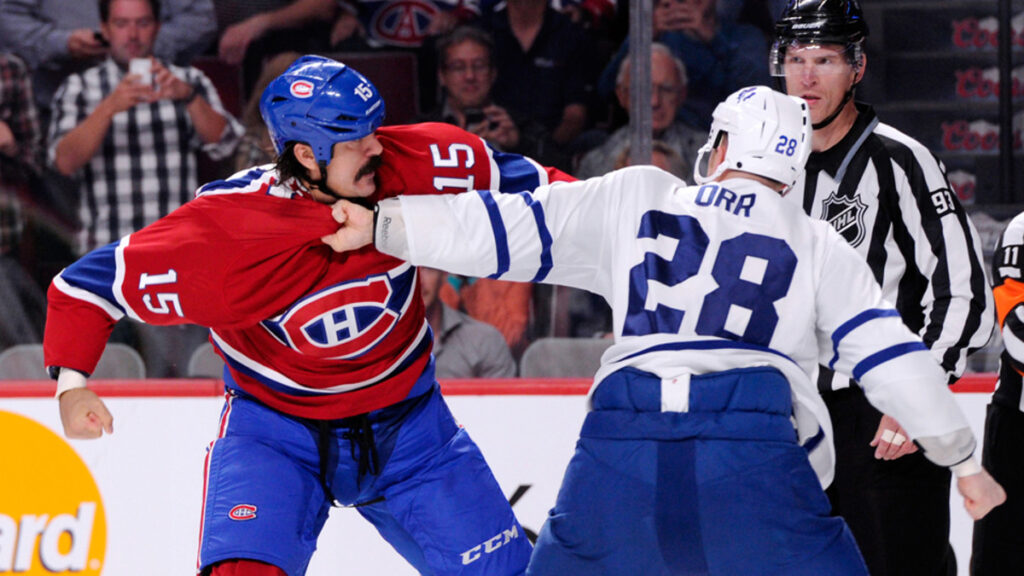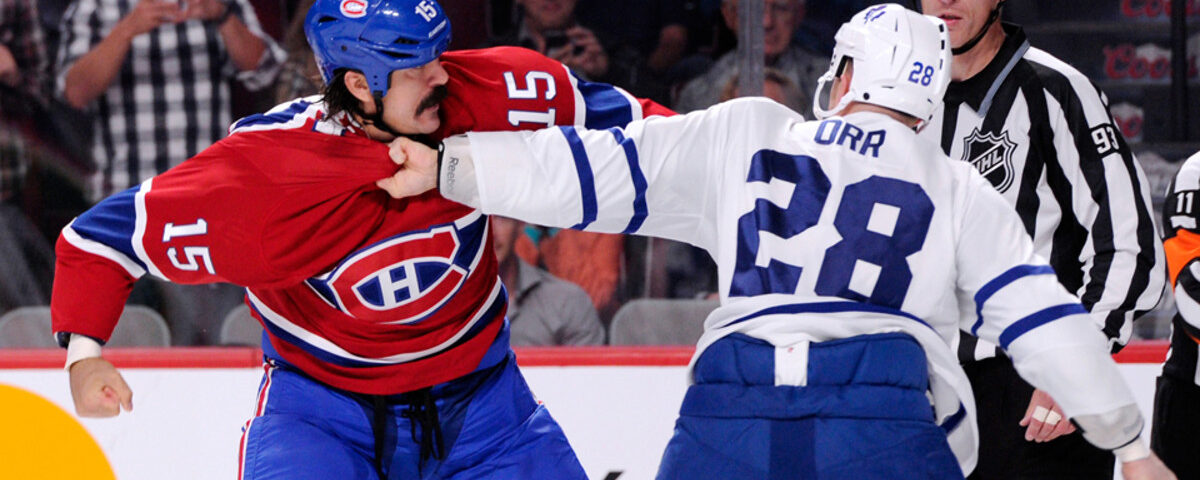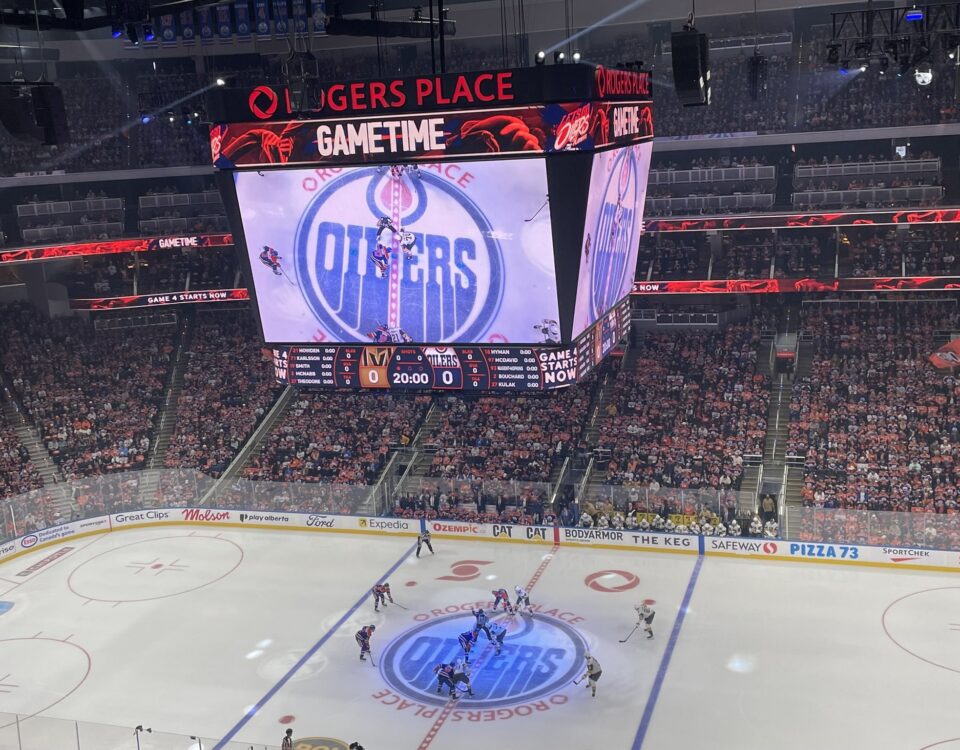
Implications of the Kapanen claim
November 20, 2024
November Goalie Power Rankings
November 21, 2024November 20, 2024 by Josh Boulton
Washington Capitals enforcer Tom Wilson was involved in a fight with Jack McBain of the Seattle Kraken on Monday night. The fight was a direct response to a play between McBain and Capitals ageless superstar Alexander Ovechkin, who was injured in a collision between the two earlier in the same game. The Capitals captain had to leave the game with an apparent knee problem and the extent of his injury at the time of this writing is unknown.
Unsurprisingly, Wilson is being praised for defending the honour of his Russian teammate by challenging McBain, and perhaps rightly so. McBain played his part by accepting the challenge and fighting, and all became right in the hockey universe; but three questions come immediately to mind:
Was this really a play worth policing? Should McBain really have to accept that challenge? Should the NHL allow players to police the game?
The answers used to be obvious. Yes, yes, and yes. The answers to these questions aren’t so simple anymore.
Ovechkin has been red hot this season, leading the league with the most goals scored. By the end of the year, he could possibly also lead the league in most goals scored… ever. He sits just 27 goals away from passing Wayne Gretzky for first place on the NHL’s all-time goal scoring list. Seeing any teammate go down, especially your long time franchise leader who is on the verge of making history, usually triggers a reaction in hockey players to “do something”. To “stand up for my guy”. To “send a message”. And of course, there’s an unwritten rule for the other team that if they’re going to make plays like that, then they have to “answer the bell”. You “can’t run around doing that”. You can’t “take runs at our guys” or “take liberties” without expecting retribution. These are all the catchy little phrases used by fighting pundits the world over to justify reactions to things teams and players don’t like.
It’s “The Code”.

Many voices are seriously questioning this thought process, and Sportsnet panalysts Kevin Bieksa and Jennifer Botterill are probably the strongest examples of each side of the spectrum. Bieksa is a respected, well spoken former NHL player who typically agrees with the vigilante justice system he lived in and abided by in the NHL. Botterill is a fearless, outspoken advocate of the NHL punishing players who go too far in taking matters into their own hands. These two best represent the growing divide amongst the millions of fans who argue on a weekly basis about who’s right and who’s wrong.
In today’s “you’re either with us or against us” world where we have to choose sides on everything, I’d like to introduce a controversial middle ground option: it doesn’t have to be one or the other. They’re usually both right.
Using our Wilson vs McBain example, the situation was McBain had been carrying the puck, but it got away from him a bit. Ovechkin recognized this, changed his path of travel to go toward the puck, and got there ahead of McBain. Their legs collided and Ovechkin went down. Now, let’s apply the three questions and see how we feel.
Was this really a play worth policing?
Both yes and no are true. There’s never a wrong answer to this. It depends on who you ask and when you ask them. Sometimes under certain circumstances, even the most mundane things are worth snapping over. I personally think this was an accidental collision between two players going for the puck. Others are calling it a knee on knee hit. Some even think it was dirty. I don’t think this was worth fighting over. Wilson obviously thought it was worth fighting over. If his teammates like him for it and that’s what his coaches want him to do, that’s really all that matters here. He’s paid five million dollars a year for his opinion. I’m not. We’re still both right.
Should McBain really have to accept that challenge?
In a nutshell, yes and no are again both true. This question exposes the biggest flaw in the player-controlled policing system. The way things are set up, the only ones who can truly answer this question are the Capitals. The policemen always dictate the terms, and that’s wrong. McBain could believe (as I do) that he did nothing wrong and has nothing to answer for; but we all know if he hadn’t fought, history would suggest the Capitals players would make a mental note and then at some point either later this game or even months down the road, they’d make him pay one way or the other anyway. This could mean taking out McBain, or it could mean going after one of his teammates. It doesn’t matter to them how their own player got hurt. Clean, dirty, accidental or intentional. It doesn’t even matter who did it. The point for them is if they’re player got hurt, someone else needs to get hurt. End of story. Right now, it’s just easier for him to fight so everyone can move on.
Should the NHL allow players to police the game?
Herein lies the divide. Most fans think if you punish a player for an action it means you think the action was wrong. They also believe by suspending a player you’re preventing them from standing up for their teammates. You’re preventing them from protecting themselves. Therefore to most, you can only either want the players to police the game or want the league police it. Once again I tell you, it doesn’t have to be this way. It can be both.
Players aren’t using clear and measurable metrics for their responses. They’re feeding off emotion. A governing body can’t do that. Neither the NHL’s officials nor the Department of Player Safety should care about feelings. They should both base their decisions on if a play was illegal or not and how avoidable it was, not on whether they think the guy “had it coming”. The discipline system has to be the order to the chaos. This includes any form of vigilante justice. All of it can be justified. That doesn’t change the fact that some of it is legal and some of it isn’t.
The reality is a player can choose to send a message whenever and however they want. No instigator rule or suspension scale or fighting ban will ever take that right away. On the other hand, the NHL should consistently penalize players that break rules.
At the end of the day, it’s all about accountability. For all.
Related: Chris Simon, Fighting, Concussions, and CTE in Hockey: Part One


